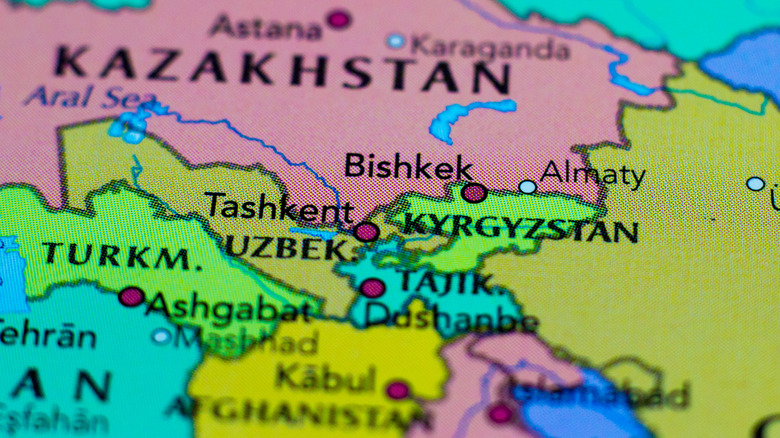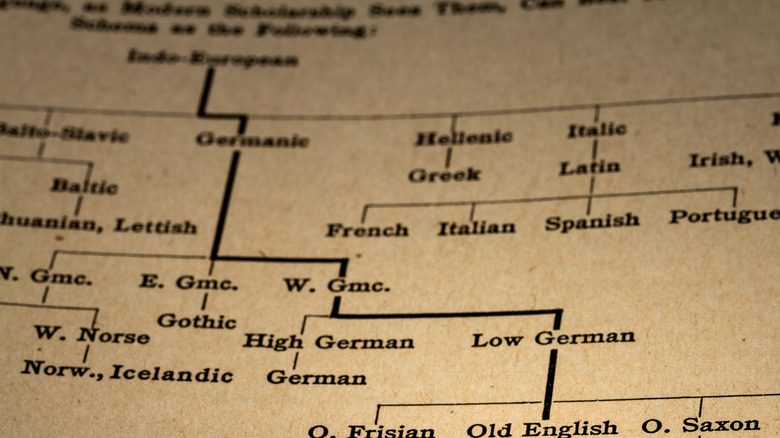The Real Reason So Many Countries End In -Stan
If you've ever wondered about the history of a word or phrase, that's etymology. If it's an entire language that piques your curiosity, that's linguistics. And what about an entire language family of an extinct language that branched off into many different tongues still spoken to this day? That's ... still linguistics.
Take the -stans as an example. We've got Afghanistan, Kazakhstan, Kyrgyzstan, Pakistan, Tajikistan, Turkmenistan, and Uzbekistan. Even Turkey gets in on the -stan game, calling Greece Yunanistan, and India Hindistan (via Turkey Travel Planner). Yet, these are clearly incredibly diverse countries with heaps of linguistic history that not only intertwines many of them, but that also exists entirely within each of their contemporary borders (via InfoPlease).
Now, mentioning Turkey earlier was no coincidence; a number of those countries can trace their history back to the Ottoman Empire. Consequently, Kazakh, Kyrgyz, Turkmen, and Uzbek speakers will find many similarities between their native tongues and Turkish. Furthermore, most of the -stans were part of the Union of Soviet Socialist Republics, under which existed policies, both de facto and de jure, that served to both deliberately segregate all Turkic-speaking peoples, and promote unity in Soviet society by forcing Russian classes upon all residents (per the University of Pennsylvania). Tajik is a completely separate language in the Indo-Persian family that, due to its larger neighbors, had adopted many more Russian and Turkic phrases over the course of the 20th century (via Pars Times).
This might make you wonder, with countless international disputes involving place names, how the heck did we end up with so many "-stan" countries?
You can't spell Istanbul without stan
Although it was determined that Tamil is the world's oldest extant language, according to Asia Times, roughly around the time that Tamil was invented, Proto-Indo-European — basically the sole predecessor of all Greek, Latin, Celtic, Germanic, and Sanskrit lingo — had already been in use for thousands of years (per Rice University). Unfortunately, no written text of Proto-Indo-European, or PIE for short, exists. However, again according to Rice University, in the 1850s and 1860s, linguistics scholars began to reconstruct sounds, words, and phrases of PIE; they discovered that its origins are centered on the Black Sea, from where it spread throughout Europe, the Near East, and even parts of India between 5000-6000 years ago.
As MentalFloss details, we now know that the prefix "st-" meant "stand." That led to the Russian suffix "-stan" coming to represent "settlement," and through nomadic herders, spread to present-day Iran, Pakistan, Afghanistan, and India, whereupon it took the meaning "place of." The descendant languages of Urdu and Pashto kept that meaning; to wit, Pakistan means "land of the pure," and Afghanistan, "land of the Afghans," referring to the Pashtun peoples, the country's historical majority. Uzbekistan, Turkmenistan, Tajikistan, Kazakhstan, and Kyrgyzstan have kept with -stan suffix due to their association with Russian, the main language of the Soviet Union.
Over the past 20 years, various countries have changed their official names to better reflect their linguistic heritage. Might some of the -stans do the same?

